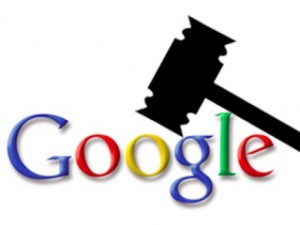Google Books Settlement Raises Copyright Concerns
The amazing world of reading has certainly felt the effects of digital technology. Bookstores and magazine stands are quickly being replaced by online literature, electronic readers, and podcasts. Even the act of reading itself may be slowly getting outdated. As we’ve blogged about before, many e-book readers have audio reading functions that read aloud to you so you can proceed with your all-important multi-tasking while listening.
And recently Google was poised to take over the world of digital books. For the last several years, Google has been in the process of acquiring and scanning the world’s books to build their online library collection. It appears that Google was well on its way to creating the ultimate online beast of a library, if not for a federal judge who rejected a massive Google book agreement.
 Google’s proposed agreement would have accomplished several things: first, it would allow Google to be compensated for the book scanning and collecting it had done in the past. Secondly, the agreement would have allowed Google to work in conjunction with several publishers to expand the library to create a massive multi-million title Google bookstore.
Google’s proposed agreement would have accomplished several things: first, it would allow Google to be compensated for the book scanning and collecting it had done in the past. Secondly, the agreement would have allowed Google to work in conjunction with several publishers to expand the library to create a massive multi-million title Google bookstore.
The deal would also have been effective internationally, and would allow Google to obtain and sell “orphan works”, or works where the author isn’t immediately known. It would also allow Google to provide much longer scanned snippets of text for consumers to view before they finally purchase the literature.
Google’s proposed settlement has been initially rejected by Judge Chin in the case of Author’s Guild vs. Google. Judge Chin cites three reasons why the Google Books agreement is bunk: first, it would basically allow Google to monopolize the book search field; second, it would allow for invasions of personal privacy; and third, the $125 million deal would allow Google to appropriate copyrighted work without permission.
Now, it’s not so much the first two concerns that grab my attention- everyone knows that Google is already dominating the web, and our privacy is already shot to pieces. Rather, it’s the copyrighting issues that concern me. Google’s band-aid solution to the copyright question was this- concerned authors would be allowed to “opt out” of the settlement to protect their works. Google even created a Book Rights Registry where copyright holders could submit claim forms for their works.
Is it just me, or does this seem completely backwards to you? This is basically like saying, “we are appropriating your copyrighted works, and if you don’t like our program, we are being generous enough to allow you to opt out”. Judge Chin recognized this and suggested that Google substitute an “opt-in” choice for the nonsensical opt-out procedure.
Before I continue my rant, I’d just like to say that I do think online and digital libraries are a great idea. Electronic books certainly allow consumers to access titles that may be difficult to come across. This is especially true with older titles and international works that aren’t available in the U.S. And Google’s bookstore would potentially allow access to some of the most well-respected university libraries, such as the ones at Oxford and Harvard, an idea which I like very much.
But on the other hand, if you’re going to build an online digital book collection, it’s got to be done correctly! You can’t just use people’s protected pulp without their permission.
And it has taken humanity’s lifetime to amass all the book knowledge- so really there shouldn’t be any rush to catalogue everything, especially without giving credit where it is due.
This case will definitely affect the literary world more than we may realize. Judge Chin’s recent findings teach us the importance of protecting one’s intellectual and artistic creations. It appears that the author of the (near) future may have to be as keen on their copyrights as they are on the stories they have to tell. We may see the emergence of the author-lawyer who is skilled in the art of legal self-defense.
I believe that basic copyright knowledge will probably have to be integrated into any educational path towards authorship. Part of the reason why “orphan works” exist is because writers don’t know about their literary rights to begin with. Maybe as early as middle or high school, young writers should at least be informed of the great changes that are happening within literary channels, including all the different devices out there. By the time college rolls around, potential authors should be allowed to take courses teaching them how to protect their works.
In the past, much knowledge was lost whenever a document or script was lost. But the new challenge here doesn’t have to do with the books but with the authors themselves. Trampling on author’s rights could create an even bigger mess than the destruction of the Alexandrian library.


Comments
Thanks for the article. Yea, the opt-out choice seems ridiculous; the opt-in choice you suggest seems like a better choice. Google shouldn’t have the power to digitize entire works without copyright permission where it’s due!
Also check out: http://blog.wexlerwallace.com/?p=685
Hi Ji-Sook,
Agreed, in my opinion situations like this can arise out of a few factors, such as: 1) impatience to follow all of the legal requirements, and/or 2) patent disregard for people’s rights. Hopefully this case will create a solid foundation for future claims.